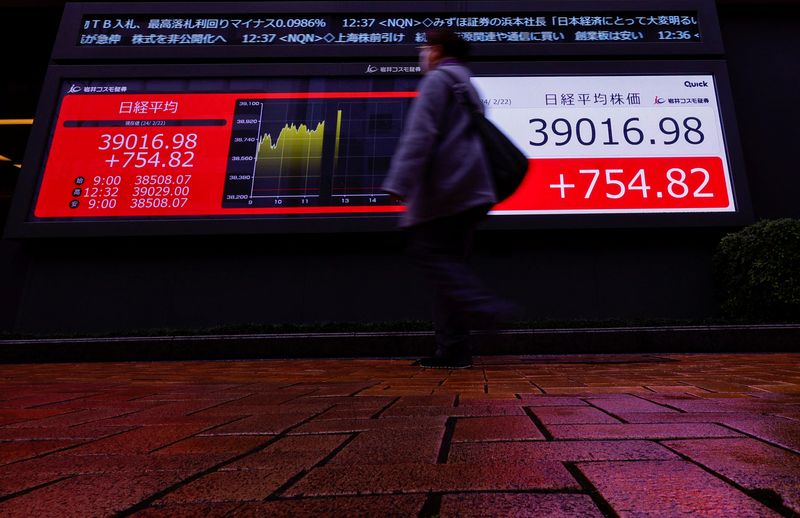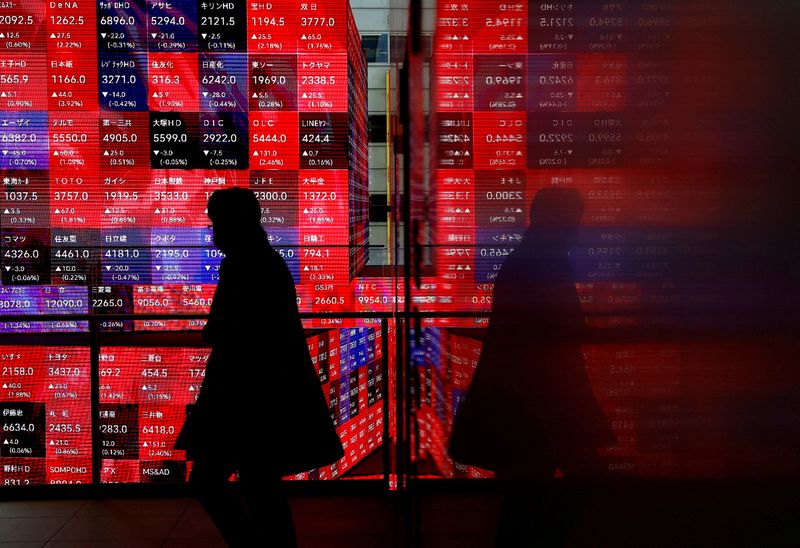(Corrects title of Jesper Koll in paragraph 20)
SYDNEY (Reuters) -As Japanese shares finally reclaim past peaks it harks back to a time when everyone in the country seemed to be a stock market millionaire - a Tokyo car park was worth more than New York's Central Park and the future looked like one endless party.
It is difficult now, after three long decades of deadening deflation, to imagine how truly wild the 1980s' bubble was in Japan, and how speculation upended its strait-laced culture.
Kazukuni Yamazaki, an 87-year-old investor and a former Nomura Securities employee, remembers there used to be a digital board showing stock prices on the first floor of his building.
"Everyone, including groups of young office ladies, was standing there, checking stock prices and squealing in excitement," he says.
"It was really crazy that everyone was talking about wanting a golf club membership that cost 500 million yen when none of us was really into golf," he adds. In 1989, 500 million yen was about $3.5 million.
"It was totally normal to take a day trip to Hokkaido just to eat ramen for lunch."
Hokkaido is 831 kilometres (516 miles) north of Tokyo, so the journey is like popping out from Paris to Barcelona.
The Nikkei share average started 1980 at 6,867 and ended the decade at 38,915. It rose every single year that decade, sucking in speculators and culminating in gains of 40% for 1988 and 29% for 1989.
On Thursday, the Nikkei finally surpassed its 1989 peak, rising above 39,000.
At the peak, Japanese shares accounted for 45% of the global stock market, well ahead of the United States at 33%. These days it is 6%, and the Nikkei is not even worth as much as tech firms Apple (NASDAQ:AAPL) and Nvidia combined.
The Japanese frenzy also spread to the ground beneath their feet. Land values in Tokyo rose 58% in 1987 alone so that a single square metre of the prestigious Ginza shopping precinct changed hands for 32 million yen, or about $230,000.
The 3.4 square kilometres (1.31 square miles) occupied by the Imperial Palace was worth more than the entire real estate value of California.
Just the capital gains from stocks and land in 1987 topped $3.4 trillion, or roughly 40% of annual GDP.
"I spent $1,000 for a cat as a present to my girlfriend, and I wouldn't spend $20 on a present for my wife now," says Mike Allen, a research director for Azabu Research, who started with Barclays (LON:BARC) in Tokyo in 1987. "People did stupid things with their money because we just thought it would never, ever stop."
"We all knew this had gone crazy, but we didn't really know why."
The rising tide of wealth and industrial might led to a spate of best seller books and Hollywood movies on how Japan owned the future.
In one illustrative scene from Ridley Scott's 1989 crime drama "Black Rain", a Japanese cop tells Michael Douglas's New York detective that America just doesn't make anything anymore.
However, the land bubble was inflated by a mountain of debt, with property loans from non-bank lenders growing from 22 trillion yen in 1985 to 80 trillion yen at the end of 1989.
When prices crashed, that debt turned into bad loans and became a millstone around the financial sector, a major reason the resulting economic downturn lasted so long.
These days, decades of sub-par economic growth, miserly wage awards and a rapidly ageing population have left the Japanese in no mood for bubbles, whether in markets or bottles.
"In 1989, it was Japan itself that was convinced that nothing could go wrong, that Japan was going to take over the world," says Jesper Koll, Monex Group global ambassador and an expat since 1986.

"That's obviously hugely different this time around, because yes, I'm fully aware that global investors think Japan offers a lot of opportunities, but domestic investors are still extremely sceptical."
($1 = 149.9 yen)
